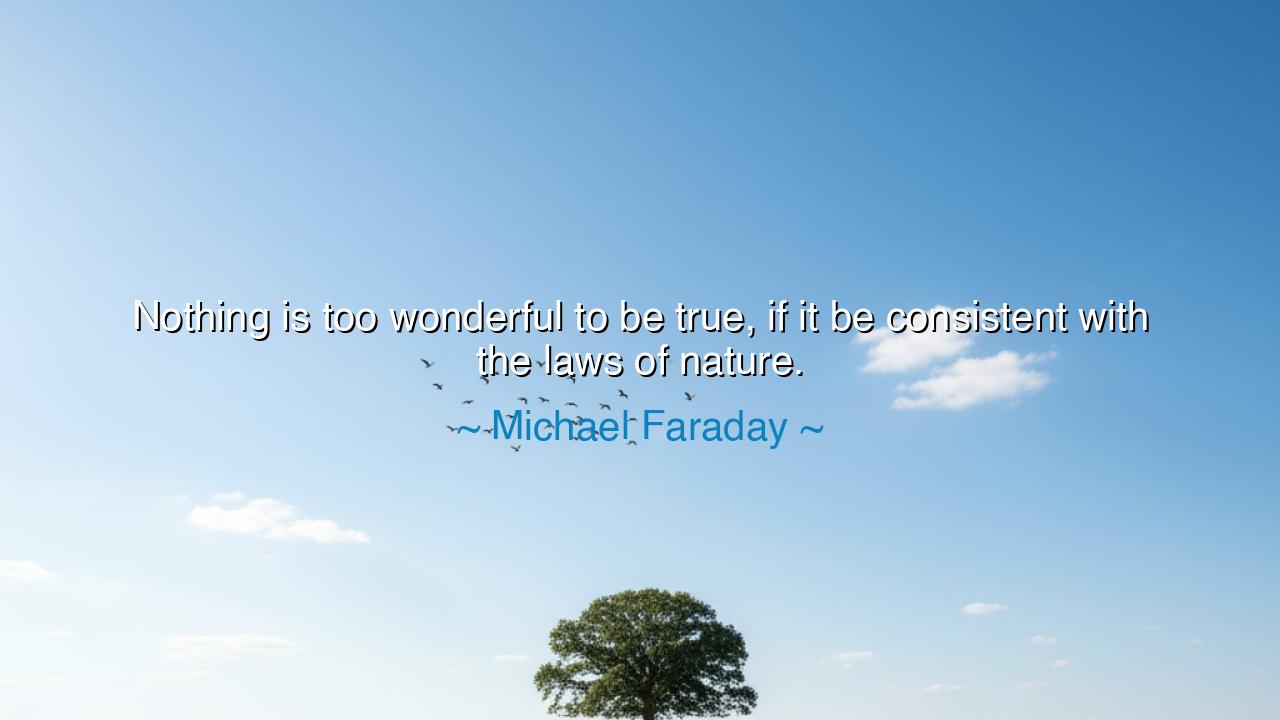
Nothing is too wonderful to be true, if it be consistent with






Hear the words of Michael Faraday, the humble bookbinder’s apprentice who rose to become one of the greatest minds in the history of science: “Nothing is too wonderful to be true, if it be consistent with the laws of nature.” In this single utterance lies the marriage of wonder and discipline, of imagination and reality. For Faraday, who discovered the secrets of electricity and magnetism, the world was not bound by small possibilities. To him, the universe was vast, rich, and full of marvels. Yet he tempered this vision with wisdom: that true wonder does not exist apart from the eternal laws of nature, but within them.
The origin of this saying rests in Faraday’s life as a man of both faith and science. Born poor, without access to formal education, he rose through sheer curiosity and relentless labor. The world told him that such discoveries as invisible forces of electricity and magnetism were too strange, too fanciful to be real. Yet Faraday pressed onward, believing that if the universe was governed by divine order, then even the most marvelous truths could be uncovered — so long as they obeyed the hidden structure of nature. Thus, the impossible became possible, not through fantasy, but through discovery.
The meaning of his words is this: that the boundaries of what is believable are not drawn by human skepticism, but by the laws that govern the cosmos. A thing may appear too wonderful for the mind of man, yet still be true if it rests in harmony with nature’s design. Who would have thought once that lightning in the sky could be harnessed into lamps and motors? Who would have believed that voices could travel across oceans in an instant, or that metal birds could carry men through the skies? Yet each wonder, impossible to one generation, became truth to another, because it was consistent with nature’s eternal laws.
Consider the tale of Galileo Galilei, who first turned his telescope to the heavens and saw moons orbiting Jupiter. Many declared it blasphemy, impossible, too wonderful to be true. Yet the laws of nature did not bend to human disbelief. What Galileo saw was real, and in time the world came to accept that the Earth itself was not the center of all things. Here again, Faraday’s wisdom proves timeless: wonders beyond imagining become reality when they are anchored in the eternal fabric of creation.
Yet this teaching is also a warning. For many pursue dreams that defy the order of nature, seeking miracles without foundation, power without truth. To chase such illusions is to walk in folly, for wisdom is not in denying the laws of nature but in working with them. The seas cannot be commanded to stand still, but they may be navigated by those who understand their currents. Fire cannot be tamed by wishful thinking, but it may be mastered by knowledge of its nature. True progress comes not from breaking the laws of nature, but from uncovering them.
The lesson for us is clear: do not fear to dream of what seems impossible, so long as your dream is faithful to the deeper order of reality. The marvels of tomorrow often sound like fantasies today. If your vision is consistent with truth, do not let the scoffing of skeptics silence you. Faraday himself was mocked, yet his discoveries lit the path to the modern age. So too, let your wonder drive you forward, not into idle fantasy, but into bold exploration, disciplined by the recognition that nature’s laws are the firm ground upon which all miracles stand.
Therefore, take these practical actions: Feed your sense of wonder; let curiosity ignite your heart. When you face the impossible, ask not whether it is too marvelous to be real, but whether it is consistent with truth. Study the world around you, for every leaf, every star, every current of wind whispers the laws of creation. And when others call your vision impossible, remember Faraday’s words, and press forward, for wonders await those who labor with patience and faith.
So remember: “Nothing is too wonderful to be true, if it be consistent with the laws of nature.” This is the creed of discovery, the hymn of science, and the song of all seekers of truth. Hold fast to wonder, but walk hand in hand with reality. For in that union lies the power to turn dreams into discoveries, and to reveal the marvels that have always been waiting in the heart of nature.






AAdministratorAdministrator
Welcome, honored guests. Please leave a comment, we will respond soon